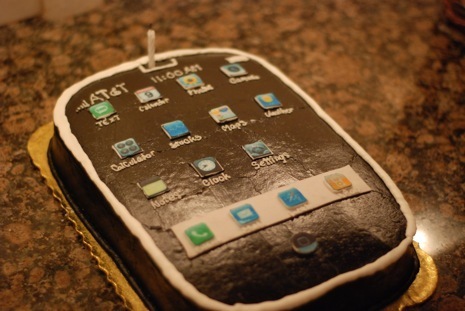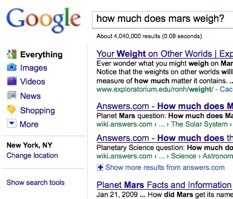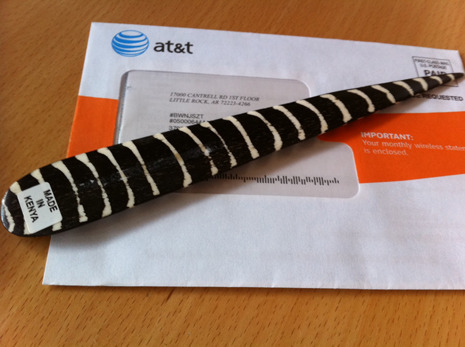Susan Orlean's Blog, page 8
July 14, 2011
Birthday Alert

My ace in the hole as a human being used to be my capacity for remembering birthdays. I worked at it. Whenever I made a new friend, I made a point of finding out his or her birthday early on, and I would record it in my Filofax calendar. I then took enormous delight in surprising my friend when the day rolled around. It took time and effort; at the end of every year, when I'd bought my new Filofax calendar insert, I spent an entire evening transferring all of my friends' and family's birthdays into the new Filofax—by hand, of course. It was a process that required great concentration. One year, when I must have been tired or distracted, I copied the birthdays from the previous year's calendar into the new one on the same day of the week but on the wrong date, so I was off on every birthday that year until I figured out my mistake. But most of the time I was golden. In fact, my birthday attentiveness was my signature talent. I liked remembering the birthdays not just of my best friends and relatives but also of those secondary friends who you're always happy to see but whom you rarely single out for special notice. They were usually the people who were most surprised that I remembered them.
And then it all went to hell. The other day, my husband—who believes every holiday and even the observance of birthdays is a plot devised by greeting-card companies—mentioned during breakfast that it was my cousin's birthday. My cousin? I was flabbergasted—not that it was my cousin's birthday, but that my husband, who doesn't spend a lot of time thinking about birthdays and doesn't really know my cousin very well, would be in possession of such arcane information. I asked him how he happened to know. He shrugged and said that Facebook told him. Or maybe it was Plaxo. No, might have been LinkedIn. And, as of this week, it could have even been Google+.
I'm glad that my cousin got an extra birthday greeting this year, but what exactly does it mean that a task that used to require effort and some amount of thought now requires just an Internet connection? Is this a good thing, or has it actually devalued the entire tradition of wishing someone a happy birthday? Because I am quite promiscuous online, in the sense of having a very broad definition of who I have in my Facebook and Twitter communities, and somehow—I don't remember how or why—signed myself up for all those address-book networky things like Plaxo and Diigo and Svpply and god knows what else, I am constantly being reminded that it's the birthday of someone I don't know at all but who is in my overstuffed social network. Sometimes I wish these near-strangers a happy birthday—why not?—but it feels entirely different from the birthday wishes that I'd deliver after those long nights transferring birthdays from an old calendar to a new one. It seems a little like cheating to have LinkedIn remind me of someone's birthday. And yet, on my own birthday, which I like to celebrate with an absurd, childish amount of fanfare (October 31st, if you'd like to enter it in your calendar now), I accepted all the birthday wishes from strangers and friends that I knew full well had been triggered by a Facebook nudge. Is it Puritanical to think something has to require a lot of effort to be sincere? Because it's easier these days to stay in touch, does it mean that staying in touch means less than it used to, when it took much more time and effort? Am I just ruing the fact that something that used to be distinctive about me is now a click away from being something everybody can do?
By the way, happy birthday, friend.
Photograph by Garrett Dimon, Flickr CC.
June 30, 2011
Problems
I have a beef with a meme. It is about problems, and has a score of variations, including #firstworldproblems, #whitepeopleproblems, #middleclassproblems, and #hipsterproblems. The first time I heard of such a meme was last year, when I mentioned on Twitter that I didn't mind travelling for work but hated having to organize and file my expenses. It was a pretty run-of-the-mill tweet, an accounting of life's annoying minutiae, typical of what gets broadcast every day on Twitter. Within seconds someone responded that this was "a #firstworldproblem." The tone was peevish; it implied that complaining about filing expenses was an outrageous indulgence since it was evidence that I was employed, that I had an employer that would cover expenses for my work travel, and, on top of that, that I lived in a first-world country where there are employed people with solvent employers.
This is all true, of course—I'm lucky to be gainfully employed, and glad my work expenses do get covered. But where was this peevishness coming from? Was the finger-wagging coming from an unemployed person in a third-world country? I doubt it. And regardless of who said it, what was the point, exactly? That having a job means never getting to say there is something about your job that is irksome? This reminded me more than anything of a maddening aspect of my childhood: every complaint I made would be refuted with an absurd extreme. Examples:
"I don't want to eat this broccoli! I don't like broccoli."
"You should be grateful you have something to eat. There are kids in the world with no food at all."
"I hate wearing tie shoes!"
"There are kids in the world who don't even have shoes." (At least my mother never resorted to the "there are kids in the world WHO DON'T EVEN HAVE FEET" comeback.)
Sometimes, certainly, the #problems meme can be hilarious. (For a good time, scroll through #drunkgirlproblems.) Sometimes the upbraiding seems deserved; if I read a post that said, "Can't decide whether to use my Rolex or my Piaget to time today's yacht race" or "My favorite porkpie hat and shredded Ramones t-shirt are at the cleaners; have NOTHING to wear to the Grizzly Bear concert!" I might be tempted to shoot back #whitepeopleproblems or #brooklynhipsterproblems, too, but I probably wouldn't. The fact is that the reason I like being on Twitter is precisely what this meme seems to scold about: hearing people air their little grievances and glories, because it's a chance to get a genuine sense of what their lives are all about. If not, why would you want to even bother with social media? If you really don't like it, just remember: there are people in the world who don't even have computers. #twitterproblems
June 23, 2011
Whitey, Lost and Found

Among life's constants used to be death, taxes, the guarantee that you could get an H&H bagel on the Upper West Side, and that the Boston mobster Whitey Bulger would remain on the F.B.I.'s Most Wanted list. Was there a sunspot this week? Or maybe some other galactic event that has disrupted life as we know it? First came the announcement that H&H is closing its bedraggled but essential Broadway shop. Yes, there are other places to get bagels nearby, but H&H, with its wordless countermen, its refusal to accommodate even the most minor requests for bagel accessorizing, and its fat, hot, heavy bagels, was the classic. (I will find bagels elsewhere, but if another Victoria's Secret or Sunglass Hut opens in that space, advancing the Upper West Side's transformation into an outdoor suburban mall, I will shoot myself.)
Businesses do come and go, but F.B.I.-informant mobsters on the lam are forever—or so it had seemed. Whitey Bulger, the slick-haired South Boston bad guy, wanted in connection with a laundry list of crimes—murder, larceny, forgery, conspiracy—disappeared sixteen years ago, having caught a whiff of his upcoming arrest from a crooked F.B.I. agent. He was legendary as a mobster, and even more legendary as a vanished mobster. In Southie, a part of town I wrote about in 2004, kids who hadn't even been born when Whitey fled knew him by his nickname, and Whitey graffiti popped up on buildings in the neighborhood long after he was gone.
When I lived in Boston, I detected a touch of local pride in his craftiness at having played the F.B.I. every which way—committing crimes while working as an informant and flipping an agent to be his helpmate and then, to put a cherry on top, slipping out of reach just as he was about to be held to accounts. This isn't to say people approved of his crimes—he was the genuine article, it seems, deeply evil—but it was hard not to marvel at his ingenuity. His disappearance provided the punchline for sixteen years of jokes about missing people. "Hey, have you seen Tom around?" "No, I think he's on vacation with Whitey Bulger." No more.
Photograph: AP Photo/FBI handout.
June 21, 2011
The Too-Big House
This week, we're having a family reunion in Hilton Head, South Carolina. The house we've rented, like many of the houses on Hilton Head, is monstrously large, almost cartoony in its proportions. There are ten of us, so the house's five bedrooms and four bathrooms are all being used, but most likely this house was built with a much smaller family in mind, or perhaps even just a retired couple. What would they do with all this space, I wonder? Can you play Scrabble in more than one room at a time? Every room is about twice the size it seems to need to be, and every ceiling is triple-height. It's a very ugly house, but fancy. And very, very big.
Places like Hilton Head, with water adjacency and nice climates, are in high demand, and land values are insane. In the case of Hilton Head, which was developed in 1970 on what had been a mosquito- and alligator-infested swampy barrier island, land value has leaped from nearly zero to now unaffordable. The first batch of houses built here might have been normal-sized, but in the ten years that I've been coming here on occasion, I've seen them replaced by new ones that are enormous. About five years ago, we rented a house right on the beach that was arena-sized. We loved being right on the ocean, so we asked the owner if we could reserve time for the next year. No, he said, it wouldn't be possible; he was tearing the house down. Why? To build a bigger one on the same lot. We saw the finished product a few years later: it looked like a house with severe edema, swollen to bursting, built to the very edge of the property line.
My husband and I built our house in New York about five years ago, and right before we began, I fell under the spell of the small-house movement; I had dozens of Post-Its in my copy of "The Not-So-Big House" marking author Sarah Susanka's recommendations for designing a house that was efficient and inviting without being pointlessly gigantic. It's not really such a new idea. A few weeks ago, I stayed for a night in the Penfield House, which was designed by Frank Lloyd Wright. It's an amazing place, with a jazzy sort of geometry. It's also quite small (even though, as it happens, the owner, Louis Penfield, was six foot eight, and had actually wondered whether Wright could make a house that would work for a person his size). But the house is big enough. Everything is ingeniously designed to make use of all available space, and the floor-to-ceiling living room windows make it feel like there is only a thin skin between you and the outdoors, which gives the illusion of spaciousness. It's a great house—that is, in the sense of the word "great" meaning an impressive accomplishment, rather than "large."
Oversized houses, like oversized cars, seem to be a particularly American fixation. In many other countries, the land available is so limited and the cost of building so high that most people wouldn't even consider building a Hilton Head-style jumbo. And the expense—in economic and environmental terms—of heating and cooling these places is vast. What's funny is that these mega-mansions are so often located somewhere people go because they want to enjoy the natural environment. The house we had wanted to rent again had very little land around it when we rented it. Now, in its bulked-up state, the outdoor space is a narrow margin of sand and grass, not even wide enough to walk on.
June 17, 2011
Google It

My son started using "Google" as a verb about a year ago, when he had just turned five. He would ask me a question—something like how much Mars weighs, or the number of vertebrae in a dinosaur spine—and he'd grow impatient as I dug through the rubble of my memory looking for the answer. Finally, he would reach for my phone and wave it at me. "Never mind, Mommy," he would say, pityingly, "you can just Google it."
Despite the wounding of my parental pride, I didn't really mind. I don't care that much about rote memorization. An old boyfriend of mine used to get into lacerating arguments with his parents over facts, and I used to watch on in mute astonishment. How could anyone actually argue about something that could be looked up? Arguing about what something means—that makes sense to me, but not arguing over a simple, Googlable fact.
So what to make of the news that American students are terrible at history? Unfortunately, this is of the very worrying sort of deficiency, not the you-can-just-Google-it sort. Most fourth graders can't say why Abraham Lincoln is an important historical figure? Wow. This is far more distressing than if the news had been that fourth graders were bad at reciting multiplication tables, because you can, in fact, Google that. Like teaching cursive writing—which many schools are abandoning—memorizing things that can be easily figured out or looked up sometimes seems a little pointless, except that some neurons are probably engaged each time you plug information into your brain. Being able to reel off a list of dates in history, while useful, is so much less important than understanding why those dates matter, or understanding enough about the way civilization has developed to be able to figure things out from what you already know. The questions that the fourth graders (and all the students in the study) failed on were, unfortunately, questions that required real understanding to answer. When a machine can do something better and faster than a person can, I am happy to let the machine do it. (Why tie your shoes when you can use Velcro? Why add a long list of numbers when a calculator can do it faster and more reliably?) But understanding who we are and how we came to be the way we are? That's not Googlable now, and I hope it never will be.
June 8, 2011
Animal Roll Call

Summer is now upon us, and we are—to borrow a phrase from the restaurant-reservation business—fully committed, animal-wise. Our summer visitors, twelve Black Angus cattle, arrived a few days ago, and probably fainted with pleasure at the sight of our pasture, which is hip-high in alfalfa. The cattle are young and small, so when they're grazing they almost disappear in the grass; they become nothing more than dark shapes drifting through the greenery, like storm clouds through a sky. If they eat their dozen or so square meals a day, they'll be gaining two pounds every twenty-four hours, which means soon enough the grass will be chomped down and the cattle will be bulked up. We don't name them, but we call out their ear-tag numbers with great affection when we visit and give them snacks.
I have new hens, too: four young Swedish Flower chickens, a rare breed with a name that cracks people up whenever I say it, for some reason. The chicks are crazily speckled and adorable. I'm told that the breed is highly prized in Sweden and that the Swedish chicken authorities frown on exporting them. The person who hooked me up with them would only say that "someone" wearing a commodious brassiere smuggled a breeding pair into the United States. I think the safest policy for me is to know nothing more than that intriguing tidbit, although I can't help but spend time imagining what it would be like to have two chickens in my bra on a transatlantic flight. Moving right along, I am sorry to report that my two oldest, dearest chickens died this winter: Tookie, who was the only one of my original four chickens still extant, and Statue of Liberty, a beautiful and freakishly good-natured rooster my neighbor gave me in exchange for my own beautiful and freakishly bad-natured rooster Laura. Both Tookie and Liberty were in their senior years. They appeared to have died of natural causes—maybe the hard winter was too much for them. Chicken society abhors a vacuum, so immediately after Tookie and Liberty died, their positions as dominant male and female were filled. Helen, a sturdy Rhode Island Red, is now my alpha hen; Frowny, a fat white fluff ball with a glowering expression, is, literally, the cock of the walk.
I'd be donkey shopping right now except that there's a good chance we'll be in Los Angeles for a while, starting this September. So instead of adding to the menagerie I've been assessing the animals, trying to figure out who to bring and who to leave (temporarily) behind. How practical is it to have turkeys in Studio City, I wonder?
June 6, 2011
Anthony Weiner's Social Life
I don't think there's anything to say about Congressman Anthony Weiner that hasn't already been said, but it's hard to resist saying something. For instance, what kind of idiot sends lewd pictures of himself via social media and thinks he won't get caught? There's a big clue here: the word "social," which suggests that privacy is not a featured amenity on the sparkling intertubes, and least of all on Twitter or Facebook, both of which are venues popular because they allow us to dissolve the membrane that separates us into individual organisms and allows us to transmit what we had for lunch to dozens or even thousands of listeners—friends, followers, whatever—around the world. An underpants photo published on Twitter is about as private as swearing on the radio. But that's the whole point, I suppose. (This is where you cue the sighing observation that "he must have wanted to get caught.") I saw a study recently noting that a walloping percentage of divorce proceedings now reference something found on Facebook. Surprise! There are more private channels out there—the direct message function on Twitter, which Weiner, we now know, thought he was using when he sent his underwear tweet, and private messaging on Facebook. In theory, no one but the recipient can see those, but even so, when I use those to communicate with someone, I'm vaguely aware that there are lots of people kind of hanging around. It's like whispering to your companion during a dinner party: you might not get heard loud and clear, but only a fool wouldn't take note of the possibility of leakage.
Stories like Weiner's (and John Edwards's and on and on and on) have such an excruciating arc: the squirming denials, the laughably implausible explanations, then the slow drumbeat toward the inevitable admission. You could almost set your watch to it; it's that predictable a process, complete in three acts, and the last one always a little too long.
May 24, 2011
Why "Mom Jeans"?

When did "mom" become a swear word? The other day, I was having a conversation with friends about how President Obama, despite being a very handsome man, is a bit of a nerd. "Did you see him when he threw out the first pitch at the All-Star game?" one of my friends said. "He was wearing mom jeans." This was just a day after I was talking to a woman who had just had a facelift. She said she had told her plastic surgeon that she wanted to look fabulous and not, as she put it, "like a mom." Like a what?, I asked her. "Like a mom," she repeated. "I mean, I am a mom, but I didn't want to look like, you know, a mom."
I guess the current definition of "mom" is someone who wears their jeans high enough to hide their tramp stamp; is attractive but genderless; is, in other words, nice, slightly frumpy, has old cookie batter dried in her badly-in-need-of-an-updated-haircut hair, exudes not one jot of danger or adventure or abandon although somewhere, under her really-should-give-it-to-Goodwill-it-is-so-old-and-unstylish flowered top, you can detect a whiff of a once-exciting woman. In other words, please kill me now. Why has that word come to be such a horror? It started to bother me long ago—make that six years ago, when my son was born, and I was suddenly slingshot into a new world and was invited to a lot of "mom" things, and—even worse—"mommy" things. Then I started hearing it in conversation constantly: "I was saying to one of the other moms yesterday…" and "The moms in the playgroup are…" and "I'm doing a few mommy-and-me classes with Fifi." Is the horribleness because it sounds so infantile? The only thing that has ever riled me in the same way is hearing couples refer to themselves as Mommy and Daddy—and I don't mean as a joke.
It's not that the term "mom" doesn't sometimes serve a purpose besides being the tender name you call the woman who gave birth to you. The aforementioned mom jeans—medium wash denim, buttoned over the slightly-out-of-shape belly, tasteful stitching, legs neither wide enough to be subversive nor tight enough to be sexy—are a real thing; having the shorthand of describing them in one quick stroke is genius. Unfortunately, I feel mortified when I hear the term because I am a mom, or—as I prefer to say—I have a child. Are there "I-have-a-child jeans"? Then again, I have a child but I wear tight, low jeans. How about President Obama jeans? I know using "mother" as a substitute in some instances would sound a little Victorian (imagine signing up for a Mother-and-Child Gymboree class!) but it sounds so much more respectful. It would defeat the implied insult in a phrase like "mom jeans"—"mother jeans" sound sober and functional rather than dorky and sad. "Soccer mothers" sound scary, actually.
Photograph: Official White House Photo by Lawrence Jackson.
May 18, 2011
Stay Out of My Dropbox

I am of mixed minds about the issue of privacy. On one hand, I understand that information is power, and power is, well, power, so keeping your private information to yourself is essential—especially if you are a controversial figure, a celebrity, or a dissident. But what about the rest of us? To be honest, sometimes I am surprised by how little I mind having my behavior monitored. For instance, I find the ads that Google runs next to my Gmail account, which are triggered by keywords in my e-mails, more entertaining than insidious. (When I was writing a story about mules being used in the military, the Google snoop mistook my repeated use of the word "mule" to mean that I was interested in those backless shoes known as mules rather than in the offspring of a donkey and a horse, and I got bombarded with Zappos ads.)
Privacy became an issue the other day in the case of Dropbox, the popular online backup service. Apparently, in its original wording, Dropbox's terms of service made it sound as if files stored there were encrypted, so employees couldn't read them, even if they wanted to. But recently the wording was changed to something a little squishier: it now seems that employees are merely "prohibited" from reading files, rather than unable. I was dismayed when I heard this, because I use Dropbox constantly, but my dismay had more to do with seeing a good company handle an issue so clumsily than thinking my privacy was suddenly compromised. Millions of files are uploaded to Dropbox every day. Even the biggest nosey body in the world couldn't go through that much stuff.
In fact, most of what I store there is so boring I can hardly read it myself, so it's hard to picture it titillating a Dropbox programmer. (Note to the programmer now reading my files: can you remind me when my son's next soccer game is? I think I uploaded the schedule last week. Thank you.) On the other hand, I back up my work there, too, especially pieces that are half-done and drafts only a mother could love. I wouldn't want anyone reading those—neither Dropbox employee nor editor nor what-have-you. But I just try not to think about it. You could go crazy thinking of how unprivate our lives really are—the omnipresent security cameras, the tracking data on our very smart phones, the porous state of our Internet selves, the trail of electronic crumbs we leave every day.
May 11, 2011
The Wayward Letter Opener

On the very same day that I ordered an iPad 2, I went shopping to buy myself a letter opener. I like to cover all my bases. I do get quite a bit of mail, most of it undesirable, but all of it needing to be opened, and I was tired of working my fingernail under the envelope flap—glue these days is so gluey!—and then abrading the skin on my finger as I yanked open another unwelcome bill. After one paper cut too many, I went to a store that carries cool odds and ends; there, a striped goat-bone letter opener from Kenya caught my eye.
It turns out that the goat-bone letter opener had a tale. Last year, the shop owner had ordered a bunch of the letter openers from a craft wholesaler in Kenya in plenty of time to have them in stock for Christmas 2010. The letter openers were loaded onto a ship that set sail for New York in early summer. It happened to be something of a Christmas tchotchke ship; besides the letter openers, there were several containers of items being featured in the Christmas catalogue of Horchow, the fancy home-goods retailer.
The rest of the story sounds like a Polar Express gone bad: shortly after leaving port, the ship was hijacked by Somali pirates, who held it hostage and broadcast their demands. Christmas shopping days and then Christmas itself came and went. Finally, a deal was made and the pirates released the ship, complete with its goat-bone mail accessories and its selections of the Horchow collection (could it have included the artisan prayer journals? The Ambella arch mantel? We'll never know). But it was still not clear sailing: the insurance on the ship and its contents was held by Lloyds' of London, which insisted that the crew detour to London for an inspection, before heading at last to New York. Finally, more than a year late and with several thousand nautical miles more than had been expected, the letter openers landed in New York and were shipped, without incident, to a little shop in Hudson, New York.
I suspect my iPad 2 will be delivered with no such back story.



